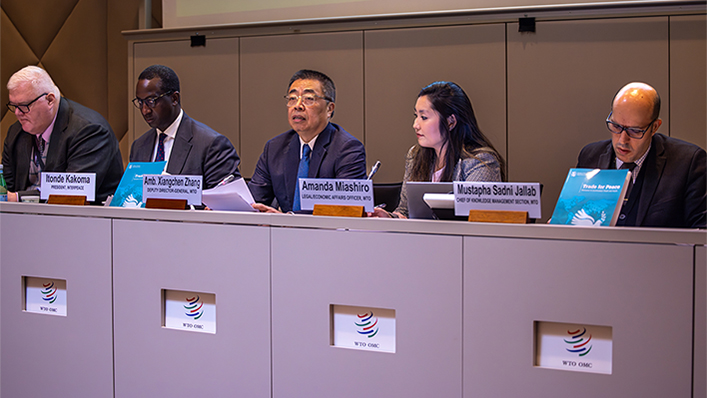
The book launch highlighted how the Trade for Peace publication “Pathways to Sustainable Trade and Peace” supports the work of policymakers, academics and practitioners by providing an in-depth exploration of the complex relationship between trade and peace.
The publication is composed of 16 chapters written by 31 authors, representing more than nine partner institutions, including the Institute for Economics and Peace (IEP), the International Labour Organization (ILO), the International Monetary Fund (IMF), the International Trade Centre (ITC), Interpeace, the Peterson Institute for International Economics (PIIE), the United Nations Development Programme (UNDP), the United Nations Economic Commission for Africa and the World Economic Forum.
“Trade is an indispensable part of building the secure, sustainable, and inclusive world we want and need,” notes WTO Director-General Ngozi Okonjo-Iweala in the publication’s foreword. “For trade to yield peace dividends, particularly in the difficult context of FCS, the trade community needs to work with other partners. It is my hope that this volume can help lay the groundwork for such collaboration to advance a 21st century vision of Trade for Peace,” she adds.
WTO Deputy Director-General Xiangchen Zhang delivered the opening remarks, highlighting the importance of the publication in the current challenging times. “This book is a concrete output from the research pillar of the Trade for Peace Programme, which aims at deepening the understanding of the trade-peace nexus and addressing the gap in literature on the interlinkages between trade and peace in its various dimensions. It is the first WTO publication on the topic with the goal of providing insights on how trade and peace interact and how governments and other stakeholders can leverage trade to foster economic development and stability,” he said. His remarks are available here.
Panellists included the co-editor of the publication Mustapha Sadni Jallab, Chief of the Knowledge Management Section at the WTO, and five authors — Alan W. Wolff, Distinguished Visiting Fellow at PIIE and former WTO Deputy Director-General, Itonde Kakoma, President and CEO of Interpeace, Franck Bousquet, Deputy Director of the Institute for Capacity Development at the IMF, Barbara Ramos, Chief of Strategies and Policies for Trade and Investment at the ITC, and Serge Stroobants, Director of Europe and the Middle East and North Africa (MENA) region at the IEP.
Participants in the hybrid event also included Maika Oshikawa, Director of the WTO Accessions Division, co-editors Patrick Low, former Chief Economist at the WTO, and Roberta Piermartini, Chief of the Applied Economic Research Section at the WTO, as well as several other authors featured in the publication.
Moderated by Amanda Miashiro, Legal/Economic Affairs Officer at the WTO Accessions Division and co-editor of the publication, the event discussed the complexity of trade and peace in light of a changed global political landscape. Panellists emphasized that fragility worldwide is increasing, with the average levels of peace at historical lows.
The discussion raised key questions about which legal frameworks and conditions must be in place for trade to be a driver of peace and stability and how to transform the capacity of actors operating in fragile and conflict-affected contexts to not only be conflict-sensitive but also to actively contribute to peace outcomes. The recording of the event is available here.
Panellists further recalled that peace is intertwined with the history of the multilateral trading system. They also highlighted the role of the g7+ WTO Group in advancing the Trade for Peace agenda for FCS. Shedding light on how fragility issues deeply affect societies, small and medium-sized enterprises and the economy, panellists stressed the importance of understanding conflict drivers and specificities of fragile regions to be able to fortify macroeconomic policies and state capacity, improve competitiveness and contribute to socioeconomic recovery.
According to IEP data, the global economic impact of violence was more than US$ 19.1 trillion in 2023, which prompted a discussion on how trade could play a more effective role in reducing the cost and impact of economic violence by promoting peace. The full publication is available here.
In addition to the publication launch, this session unveiled the Trade for Peace Research and Knowledge Database. This hub is dedicated to collecting ongoing research studies and other resources on the linkages between trade and peace, serving as a tool for stakeholders to support evidence-based policy development and strategy.
For more information, see WTO Trade for Peace, 4th edition of Trade for Peace Week
Share
Reach us to explore global export and import deals